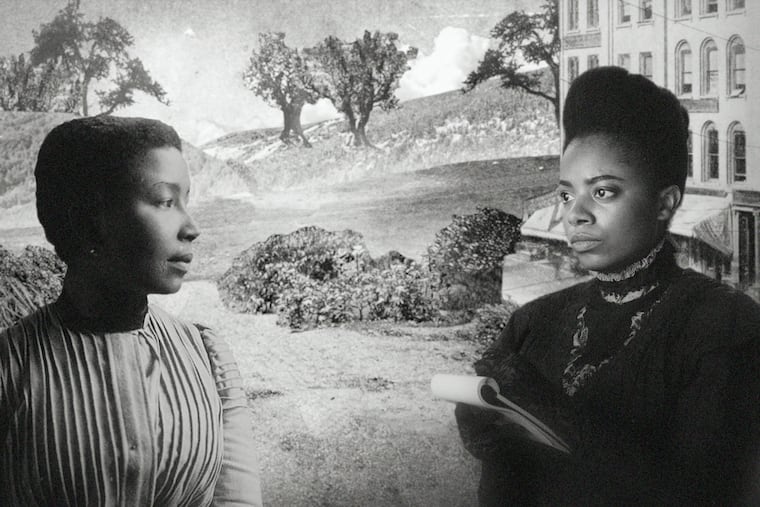‘Pennsylvania made me a fighter’: How Roger Ross Williams’ and Ibram X. Kendi’s local roots lead to radical art
A new documentary features interviews with Angela Davis and Imani Perry, animations of Ida B. Wells and Phillis Wheatley, alongside archival footage and news clips.

Easton, Pa.-born filmmaker Roger Ross Williams’ latest documentary, Stamped from the Beginning, is a fresh addition to the canon of historical documentaries. “I wanted to do something that was completely original,” the Oscar winner explained. In his adaptation of Ibram X. Kendi’s eponymous National Book Award-winning survey on race, Williams imbues a Black feminist lens. Kendi, a Temple alum, is director of Boston University’s Center for Antiracist Research.
As Williams braids America’s racist past with its present, he uses “all the tools of my toolbox” — which includes interviews with the likes of Angela Davis and Imani Perry, animations of Ida B. Wells and Phillis Wheatley, along with archival footage and news clips. The aim was to avoid the feeling of a history lesson but still remind people of America’s insidious blueprint. Stamped comes at a moment when school boards and politicians are attacking critical race theory and secreting the country’s true genesis.
Way before Pennsylvania representatives tried to restrict teachings on race in schools, Philadelphia was the first major city in the U.S. to mandate Black history in K-12 schools. Temple University was the first to offer a doctorate in the field.
Stamped from the Beginning is now playing on Netflix. Ahead of the film’s streaming release, The Inquirer spoke with Williams and Kendi.
The conversation has been edited for length and clarity.
In 2021, Pa. Reps. Barb Gleim and Russ Diamond attempted to restrict the teachings of race and sex with the TRUE ACT. How were you taught about race in your respective Pennsylvania schools?
RRW: I learned nothing about race in high school in Easton, Pa. I didn’t learn about Black history. Mostly, we had race riots, a lot of discrimination, and pain.
IXK: I was fortunate because I went to Temple where I studied African American Studies. That was a focal point of my academic studies at Temple.
What formulated your outlook on race, outside of educational institutions?
IXK: There was one pivotal moment my freshman year in college in Tallahassee, Fla. That was the [2000 U.S. presidential] election when tens of thousands of, if not hundreds of thousands of, Black votes were either spoiled or thrown out. I heard first and secondhand stories of voter suppression, which caused me to come face to face with racism and want to begin to understand it more.
RRW: Someone gave me a James Baldwin book. Then I read more James Baldwin, and I was transformed. I sat alone in my bedroom growing up as a gay kid in a pretty homophobic environment in my family’s church. Books were my escape. I also had a mother who worked as a maid in Lafayette College in Easton. She cleaned the toilets in a frat house and gave me Black history flashcards. She would go over them with me and that’s how I learned a lot of the stuff.
Kendi’s book mentions significant history of race in Philadelphia, like Mennonites calling for an antislavery petition in 1688, and Philadelphia delegates concealing racist legislation in 1787, which are not in the movie. How do you determine which parts of the book to include?
RRW: It was about how to take these racist ideas against Black people in the book and how to emotionally tell the story. I came up with this device of nine lies. Those nine lies, being the chapter headings in the documentary, gave me a structure. Within that structure, it shows throughout time how those lies become policies, are resisted against, morph into something else, and how they connect to us in the present day.
IXK: I want to add one thing about Harriet Jacobs. One thing we do not share in the film is that a group of Philadelphia abolitionists aided her in her efforts to find freedom. Ultimately, she escaped and arrived by boat in Philadelphia, where she became freed and moved on to New York. Those Philadelphia abolitionists were critical in allowing one of the main characters in Stamped from the Beginning, Harriet Jacobs, to find her freedom.
Pennsylvania has been integral to both of your formative years. What does it mean to collaborate as two people with Pennsylvania roots?
IXK: I think it’s fascinating that Roger and I both had our formative years in Pennsylvania. At the same time, we’re hoping that this film reaches people throughout the United States and the world.
RRW: I didn’t have an easy childhood. Because of growing up in Pennsylvania, I wanted to excel, succeed, and prove everyone wrong. Pennsylvania made me a fighter and a warrior against racist ideas. It’s probably why I do a lot of the work I do. Whether it’s Cassandro, my scripted film about gay hero Saúl “Cassandro” Armendáriz, or my work around racism and slavery through The 1619 Project, Stamped, and High on the Hog. I think it’s a good thing, and it’s not all negative. I had a great foundation in the Black church, even though I didn’t feel accepted. It gave me a sense of community and connected me to the Black community.
“Stamped from the Beginning” is streaming on Netflix.